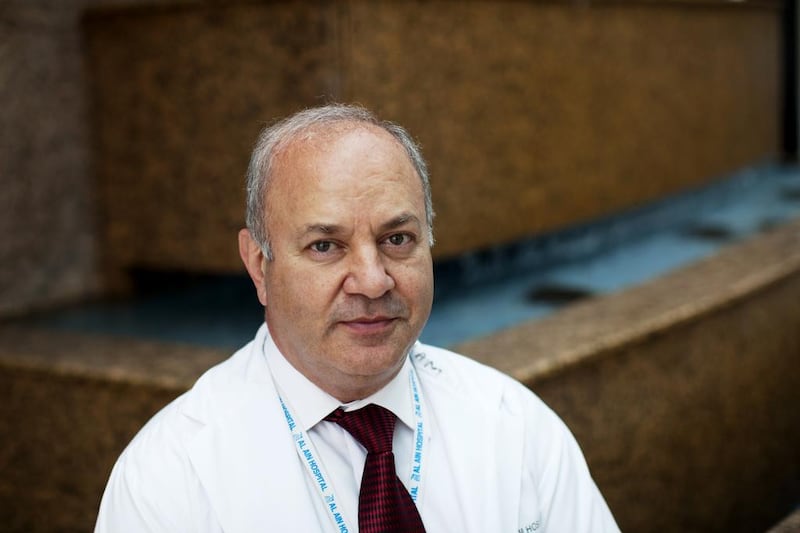AL AIN // Dr Saad Ghazal-Aswad has campaigned for cervical cancer screenings and awareness throughout the UAE in his 14 years in the country.
Now he has been awarded for his efforts in medical education.
“I am a great believer that education is an integral part of a healthy clinical service,” says Dr Ghazal-Aswad, head of the gynaecological oncology department at Tawam Hospital in Al Ain.
“To provide a good clinical service you should be involved in education.”
Originally from Aleppo in Syria, Dr Ghazal-Aswad, 58, received the award for Outstanding Contribution to Medical Education in the Middle East at last month’s annual Arab Health Congress.
A specialist in surgery for cervical cancer, he was one of two winners based in the UAE.
Dr Ghazal-Aswad has worked to educate the public and raise awareness on cervical cancer and its prevention for the past decade, giving lectures and campaigning with other doctors.
Their efforts have led to the Health Authority Abu Dhabi introducing a vaccine in high schools to prevent the disease.
The vaccine against the human papillomavirus, which causes almost all cases of cervical cancer, is offered to pupils aged between 15 and 17 at government and private schools throughout Abu Dhabi.
“We are the first country in the Gulf to introduce a vaccine against cervical cancer,” Dr Ghazal-Aswad says.
Cervical cancer is the second most commonly diagnosed type of cancer for women in the UAE.
Dr Ghazal-Aswad and other doctors also campaigned for a cervical cancer screening programme in the emirate, which started last year.
Women aged between 25 and 65 who are sexually active are offered a regular Pap smear at 25 public healthcare centres. Doctors have called for a similar programme in Dubai.
Dr Ghazal-Aswad has also taught at universities and education programmes for nurses in obstetrics and gynaecology, published articles, and participated in surgical and oncological conferences.
He regularly gives lectures in Al Ain, Abu Dhabi and around the Arabian Gulf.
He attended university in Syria, then continued his education in Austria and the UK, where he earned his doctorate at the University of Newcastle then worked as a consultant for more than five years.
But Dr Ghazal-Aswad, who has also been chairman of the committee for the Arab Health Congress conference on obstetrics and gynaecology, never thought he would receive the Arab Health Award.
“When you speak about education you might think it’s something simple, but it’s about all aspects of education,” he says. “So I was really pleased to have it as recognition.”
After moving to the UAE, Dr Ghazal-Aswad worked as an associate professor in obstetrics and gynaecology for more than eight years.
Later he moved to Tawam Hospital, where he worked as head of obstetrics and gynaecology, then served as medical director of Al Ain Khaleej Medical Hospital before rejoining Tawam.
He says he hopes his work towards cervical cancer prevention is mirrored in other areas of the region and throughout the UAE.
“We would like to cross borders with other emirates,” Dr Ghazal-Aswad says. “Abu Dhabi is the leader at the level of the UAE and Gulf countries.
“I would like to see this extended to other emirates and other countries in the region, because cervical cancer is a preventable disease.”
lcarroll@thenational.ae





